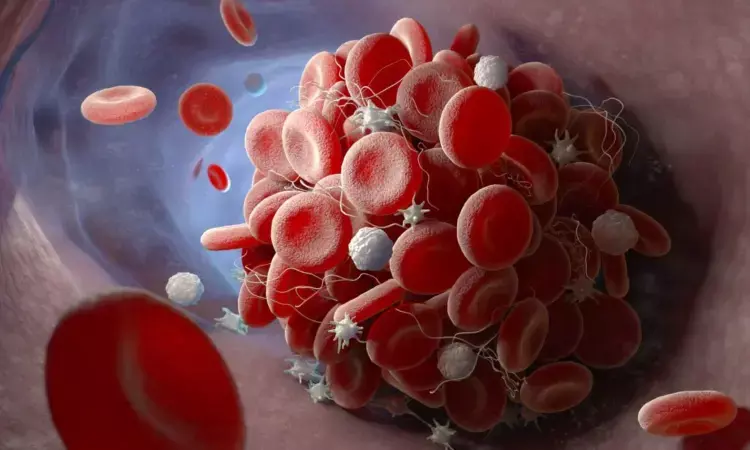- Home
- Medical news & Guidelines
- Anesthesiology
- Cardiology and CTVS
- Critical Care
- Dentistry
- Dermatology
- Diabetes and Endocrinology
- ENT
- Gastroenterology
- Medicine
- Nephrology
- Neurology
- Obstretics-Gynaecology
- Oncology
- Ophthalmology
- Orthopaedics
- Pediatrics-Neonatology
- Psychiatry
- Pulmonology
- Radiology
- Surgery
- Urology
- Laboratory Medicine
- Diet
- Nursing
- Paramedical
- Physiotherapy
- Health news
- Fact Check
- Bone Health Fact Check
- Brain Health Fact Check
- Cancer Related Fact Check
- Child Care Fact Check
- Dental and oral health fact check
- Diabetes and metabolic health fact check
- Diet and Nutrition Fact Check
- Eye and ENT Care Fact Check
- Fitness fact check
- Gut health fact check
- Heart health fact check
- Kidney health fact check
- Medical education fact check
- Men's health fact check
- Respiratory fact check
- Skin and hair care fact check
- Vaccine and Immunization fact check
- Women's health fact check
- AYUSH
- State News
- Andaman and Nicobar Islands
- Andhra Pradesh
- Arunachal Pradesh
- Assam
- Bihar
- Chandigarh
- Chattisgarh
- Dadra and Nagar Haveli
- Daman and Diu
- Delhi
- Goa
- Gujarat
- Haryana
- Himachal Pradesh
- Jammu & Kashmir
- Jharkhand
- Karnataka
- Kerala
- Ladakh
- Lakshadweep
- Madhya Pradesh
- Maharashtra
- Manipur
- Meghalaya
- Mizoram
- Nagaland
- Odisha
- Puducherry
- Punjab
- Rajasthan
- Sikkim
- Tamil Nadu
- Telangana
- Tripura
- Uttar Pradesh
- Uttrakhand
- West Bengal
- Medical Education
- Industry
No harm of intravenous thrombolysis in stroke patients with recent use of DOACs: JAMA

The use of off-label intravenous thrombolysis (IVT) in stroke patients who had taken a direct oral anticoagulant (DOACs) within the previous 48 hours did not impart excess harm, says Journal of American Medical Association.
International guidelines strongly recommend avoiding IVT in ischemic stroke patients who have recently taken direct oral anticoagulants. This prompted Thomas Meinel and peers to determine the risk of symptomatic intracranial hemorrhage (sICH) associated with the use of IVT in patients who recently used DOACs.
Data from January 2008 to December 2021 around 64 primary and comprehensive stroke centers in Europe, Asia, Australia, and New Zealand were taken for this retrospective study and ischemic stroke patients undergoing IVT (with or without thrombectomy) were included. Patients who have last taken a DOAC more than 48 hours before the stroke onset were excluded from study. A total of 832 patients with recent DOAC use were compared with 32,375 controls with no recent DOAC use. The primary outcome of the study was SICH within his 36 hours of IVT - worsening by at least 4 points on the National Institutes of Health Stroke Scale and also radiographically evident intracranial hemorrhage.
The highlights of the study were:
The study enrolled 33,207 patients where 14,458 (43.5%) were female from 62-80 years of age.
Of the 832 patients taking DOAC, 355 (42.7%) received IVT without measuring plasma levels of DOAC or reversal treatment, 252 (30.3%) received DOAC reversal prior to IVT (all idarucizumab) and 225 (27.0%) had DOAC-level measurements.
The unadjusted SICH rate was 2.5% in patients taking DOACs compared to 4.1% patients taking no anticoagulants.
Recent DOAC use was linked to a lower likelihood of SICH after IVT compared with no anticoagulation. This findings were consistent in patients with detectable plasma levels or recent exposure across different selection strategies and across sensitivity analyzes.
Source:
Meinel, T. R., Wilson, D., Gensicke, H., Scheitz, J. F., Ringleb, P., Goganau, I., Kaesmacher, J., Bae, H.-J., Kim, D. Y., Kermer, P., Suzuki, K., Kimura, K., Macha, K., Koga, M., Wada, S., Altersberger, V., Salerno, A., Palanikumar, L., … Zini, A. (2023). Intravenous Thrombolysis in Patients With Ischemic Stroke and Recent Ingestion of Direct Oral Anticoagulants. In JAMA Neurology. American Medical Association (AMA). https://doi.org/10.1001/jamaneurol.2022.4782
Neuroscience Masters graduate
Jacinthlyn Sylvia, a Neuroscience Master's graduate from Chennai has worked extensively in deciphering the neurobiology of cognition and motor control in aging. She also has spread-out exposure to Neurosurgery from her Bachelor’s. She is currently involved in active Neuro-Oncology research. She is an upcoming neuroscientist with a fiery passion for writing. Her news cover at Medical Dialogues feature recent discoveries and updates from the healthcare and biomedical research fields. She can be reached at editorial@medicaldialogues.in
Dr Kamal Kant Kohli-MBBS, DTCD- a chest specialist with more than 30 years of practice and a flair for writing clinical articles, Dr Kamal Kant Kohli joined Medical Dialogues as a Chief Editor of Medical News. Besides writing articles, as an editor, he proofreads and verifies all the medical content published on Medical Dialogues including those coming from journals, studies,medical conferences,guidelines etc. Email: drkohli@medicaldialogues.in. Contact no. 011-43720751


